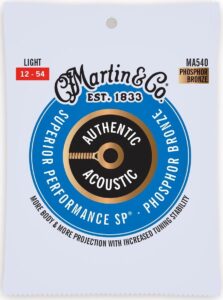Choosing the best acoustic guitar strings has much to do with the style of the line and your playing style. For example, lighter strings give some finger pickers a better dynamic response.
Round wound phosphor bronze strings are the most common. Try different gauges and alloys to find the one that fits you best.
Ernie Ball
 When musicians think about acoustic guitar strings, the first brand that comes to mind is probably Ernie Ball. This is because Ernie Ball has a long history of producing top-quality string sets known for their unique tone, high durability, and affordable prices. Ernie Ball acoustic guitar strings are made from one or more material(s) and have different gauges, influencing their sound and performance. The right acoustic guitar strings can significantly enhance any instrument’s overall tone and tonality.
When musicians think about acoustic guitar strings, the first brand that comes to mind is probably Ernie Ball. This is because Ernie Ball has a long history of producing top-quality string sets known for their unique tone, high durability, and affordable prices. Ernie Ball acoustic guitar strings are made from one or more material(s) and have different gauges, influencing their sound and performance. The right acoustic guitar strings can significantly enhance any instrument’s overall tone and tonality.
In the early 1960s, as rock and roll became popular, Ernie Ball started delving into custom manufacturing. He noticed that young electric guitarists needed lighter, more flexible guitar strings, qualities that would make bending the lines much more accessible. So he began ordering separate columns in various sizes and displayed them in a makeshift case, allowing his customers to build their own customized sets of light gauge guitar strings. This became the start of the Ernie Ball brand.
As the company grew, it gained a loyal following among rock and roll guitar players and other musicians. Its popular Slinky guitar strings played a big part in the California surf music phenomenon of the early ’60s, as well as in pop/rock recordings by artists like The Ventures and in Bakersfield country music by performers such as James Burton and Roy Nichols.
Today, many world-famous guitar players trust their sound to Ernie Ball strings. A few of the most prominent include Slash, Buddy Guy, Jimmy Page, and Angus Young. Other artists include Kirk Hammett and James Hetfield of Metallica, Tom DeLonge, and Joe Bonamassa.
While Ernie Ball is vital in the guitar strings industry, many other companies produce great acoustic strings. Some of the other leading manufacturers are D’Addario, which makes acoustic strings with different alloys and gauges. They also utilize different treatments, such as cryogenic processing, which helps improve their strings’ sound and durability.
D’Addario
Strings are essential for acoustic guitar strings players because they play an important role in your instrument’s overall tone and feel. Many different types of guitar strings are available on the market from various manufacturers, each with its unique sound and feel. To find the right strings for your acoustic guitar, try different sets and experiment with other brands to find the right combination of playability and tone. If you’re unsure where to start, stop by any Long and McQuade music store location and speak with a local guitar expert who can offer suggestions and input.
When shopping for acoustic guitar strings, you should consider the material the line is made from. This can make a big difference in the tone and playability of your guitar, as well as how quickly and easily you can bend and twist them. Strings can be made of several materials, including bronze, brass, nylon, or steel.
D’Addario invented Phosphor Bronze acoustic guitar strings back in 1974, and they’ve become the industry standard for warm and balanced acoustic tones. The corrosion-resistant phosphor bronze winding is precision wound onto a carefully drawn, hexagonally shaped, high-carbon steel core for superior intonation and tone quality.
Nylon acoustic guitar strings come in various styles and gauges, depending on the guitarist’s needs. Clear nylon is the most popular choice, offering a balance of warmth and clarity. Rectified nylon strings have a smoother, rounder tone and are often preferred by folk guitarists. Black nylon strings are similar to clear nylon, but they produce a more profound, warmer tone ideal for classical guitar.
A 13-gauge set of acoustic guitar strings is typically used on an archtop, dreadnought, or jumbo acoustic guitar and offers a higher resistance for heavy strumming and flat-picking. In addition, these strings help drive the top of the acoustic guitar for a fuller, louder tone.
Steel-core acoustic guitar strings are an excellent option for jazz, bluegrass, and country players. These strings are nickel-plated with a polymer coating that helps to protect the string from dirt, gunk, and other debris that could damage the windings and the core of the string. The layer also helps to keep the string from rusting and increases its lifespan.
Dunlop
The quality of the acoustic guitar strings you use will significantly impact your tone and playability. A wide variety of styles, materials and gauges are available to suit different playing styles and instrument types. Some are coated to prevent dirt, gunk, and other contaminants from entering the string’s windings and causing them to break. Others feature innovative technologies, such as cryogenic processing and nanoweb coating, to enhance your acoustic guitar’s sound quality and tuning stability.